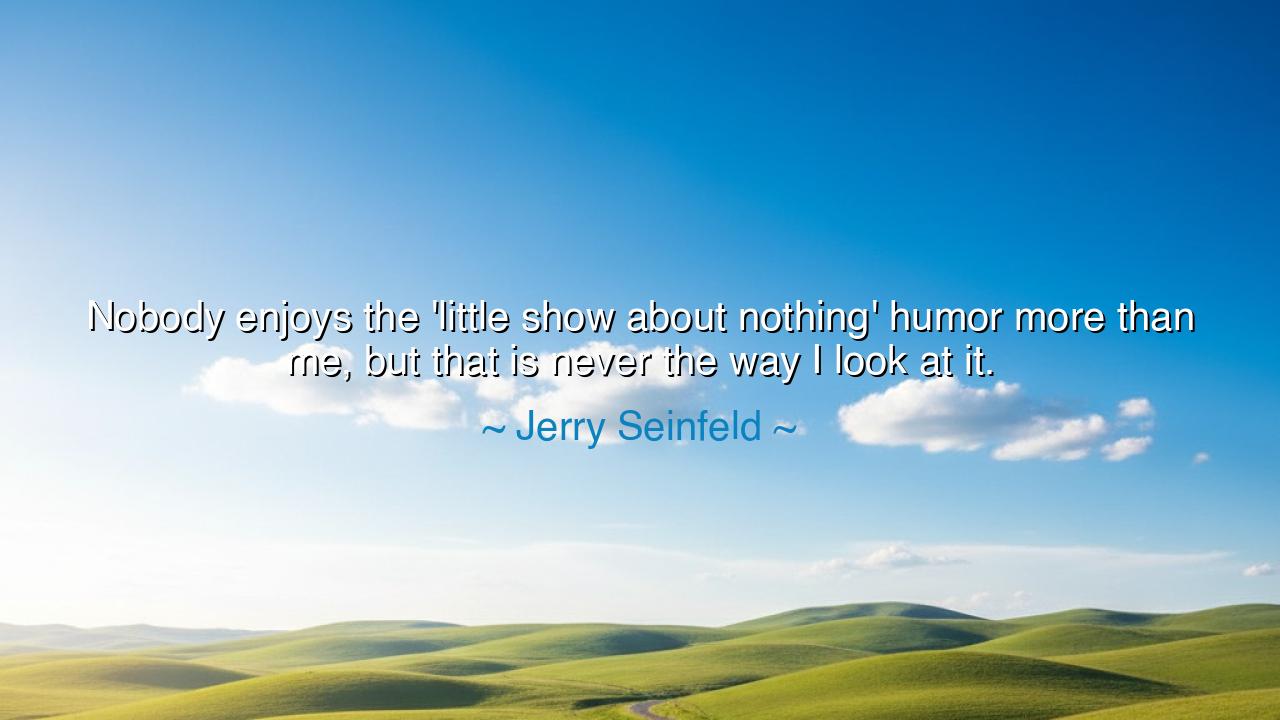
Nobody enjoys the 'little show about nothing' humor more than me
Nobody enjoys the 'little show about nothing' humor more than me, but that is never the way I look at it.






When Jerry Seinfeld said, “Nobody enjoys the ‘little show about nothing’ humor more than me, but that is never the way I look at it,” he was revealing a profound understanding of perception, art, and the human experience. To the untrained eye, the humor of everyday life may seem trivial, ordinary, or even meaningless — a “show about nothing.” Yet Seinfeld teaches that what appears mundane is, in truth, fertile ground for insight. Humor, in his philosophy, is not merely laughter at the obvious, but the discovery of patterns, contradictions, and subtle truths hidden within the fabric of ordinary existence.
The ancients, too, revered the capacity to see depth in the mundane. Epictetus, the Stoic philosopher, taught that wisdom is revealed in the ordinary: how one eats, speaks, and walks through the world. To perceive life as meaningful, even in its smallest details, is to cultivate attentiveness and discernment. Seinfeld’s humor, though framed as comedy about trivialities, mirrors this ancient insight: the ordinary is never insignificant; it is the canvas upon which human nature is most vividly painted.
Seinfeld’s work, especially Seinfeld, reflects this principle in practice. The show’s “little” events — waiting for a table, losing a button, debating etiquette — are not mere filler. They are explorations of the human condition, distilled into everyday experiences. In observing the absurdity of small inconveniences, interpersonal quirks, and social rituals, Seinfeld illuminates larger truths about pride, vanity, insecurity, and desire. The “nothing” he portrays is, in fact, a mirror of everything we are. This is the genius of his humor: triviality becomes revelation.
A historical example of this approach can be found in the writings of François Rabelais, the Renaissance satirist. Rabelais’ tales of giants, fools, and exaggerated folly were ostensibly absurd and comical, yet within them lay deep commentary on education, religion, and society. Like Seinfeld, Rabelais saw that humor could transform the trivial into a lens for understanding, that laughter could lead to reflection. What seems like nonsense often conceals wisdom for those willing to look closely — the ordinary, refracted through wit, reveals extraordinary insight.
Seinfeld’s distinction — that he enjoys the humor but does not take it lightly — reflects a broader philosophical truth: to see humor in the ordinary is to exercise discernment. Laughter becomes not an escape from reality, but a tool to understand it. The smallest events, when observed with attention and care, can teach patience, empathy, and humility. Humor in this sense is both moral and cognitive; it sharpens perception while softening pride. To laugh is to recognize the folly of our assumptions and the richness of ordinary life simultaneously.
Moreover, Seinfeld’s perspective suggests that engagement with the “little” is a form of mindfulness. Ancient sages emphasized the importance of attending to each moment fully, whether in action, observation, or reflection. In finding humor in the trivial, we cultivate awareness, patience, and insight. We learn to approach the world with curiosity and delight, seeing that even the smallest moments carry patterns, lessons, and subtle truths. Humor becomes a meditation, a bridge between amusement and understanding.
The lesson, then, is timeless: never dismiss the ordinary as inconsequential. Look deeply at the events and interactions that seem trivial, and you may discover insight, laughter, and wisdom. Humor, as Seinfeld demonstrates, is not simply entertainment; it is perception rendered visible, a tool to understand human nature in its raw, ordinary glory. The “nothing” is never empty — it is the hidden soil from which understanding grows.
In practice, this means cultivating attentiveness in daily life: observe the quirks of behavior, the absurdity of minor setbacks, and the subtle ironies of social exchange. Respond with humor that illuminates rather than diminishes. Recognize that laughter directed at life’s trivialities is itself a declaration of insight, a celebration of human complexity. As Jerry Seinfeld teaches, the ordinary is fertile ground; the “little show about nothing” is, in truth, a profound exploration of everything, and humor is the key that opens it.






AAdministratorAdministrator
Welcome, honored guests. Please leave a comment, we will respond soon